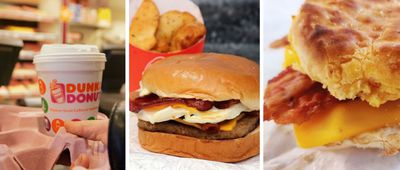Whether you're at the mall, the gym, or in a new city, you won't go far without spotting a bottle of Poland Spring, Deer Park, or Dasani in someone's hand or bag. Marketed as safer and better than tap water, bottled water is a multibillion-dollar industry in America. Do you really need to spend $1 or so on a 16.9-ounce bottle (and more for larger sizes) when there's plenty of free drinking water?
Probably not.
Drink Tap Water.
Every year, new brands of bottled water launch with new additives that promise thirst-quenching satisfaction and healthfulness. Tap water in America, however, is perfectly fine to drink and costs nothing (except for your monthly or quarterly water bill). The federal Safe Drinking Water Act (SDWA), passed in 1974, created guidelines for drinking-water quality that govern water suppliers and the water-related responsibilities of state and local governments. The SDWA requires an intricate set of processes to maintain and protect drinking water and its natural sources. Experts assert that some are stricter than systems used to process bottled water.
You can boil tap water, use purification tablets, or invest in filters like Brita, but the amount of chemicals found in tap water is so low that no health risk has ever been proven. While tap water is safe to drink, though, it may not be recommended for individuals with certain health issues and for pregnant women, or for use in baby formula due to potential contamination from lead (in the pipes) and/or other minerals.
Free Drinking Water.
If you're a fan of tap water and have no qualms about carrying around a refillable water bottle, you can get free refills at a variety of places. Although there is no law mandating restaurants to do so, tap water is offered as a courtesy at most eateries when you order food. You can also get a cup of water or ask for a refill when making a purchase at establishments such as convenience stores or coffee shops. And don't forget about public water fountains, often found in movie theatres and airports, near public restrooms, and in open areas like parks and playgrounds.
Finding free drinking water is one more thing that crowd sourcing and technology have made easier. Try crowd-generated Google Maps like this national one or this one for New York City to find the nearest water fountain when you're out and about. There's also an app for that: WeTap is an Android app featuring the world's largest database of free drinking water sources. It also lets you enter new fountain locations and report broken ones.
Certain national chains can also help you out with free tap water. Most fast food chains supply a cup of water if you make a purchase, but only some offer it if you're not a paying customer. After surveying a handful of fast food outlets in the midtown west section of Manhattan in New York City, we found three that only have bottled water -- no tap water at all. A surprising eight restaurants supplied a cup of tap water even though no purchase was made.
for non-customers? | with purchase? | |
| McDonald's | Yes | Yes |
| Potbelly | Yes | Yes |
| Burger King | Yes | Yes |
| Hale and Hearty | Yes (pitchers of water available, but usually for customers) | Yes |
| The Bread Factory | Yes | Yes |
| Starbucks | Yes | Yes |
| Chipotle | Yes | Yes |
| Sbarro | Yes | Yes |
| Dunkin' Donuts | No | Yes |
| Nathan's Hot Dogs | No | Yes |
| Subway | No | No, bottled water only |
| Pret A Manger | No, company policy doesn't allow tap water to be served | No, bottled water only |
| Tim Horton's | No, only boiling water available in store for coffee products | No, bottled water only |
*Survey was conducted in the midtown west section of Manhattan. Results may vary elsewhere, depending on local laws and tap water quality.
Keep these national chains in mind if you're thirsty and avoid the most expensive places for buying bottled water, such as sports stadiums and concert halls (where a cup of beer might cost less than a bottle of water), tourist sites and festivals. On a recent visit to Philadelphia we spotted a vendor selling Poland Spring out of his cooler near the Philadelphia Museum of Art for $3 per bottle.
Regardless how you get your water -- tap or bottled -- health professionals recommend at least eight cups of water every day. Dehydration symptoms include dry mouth, fatigue, headache, and dizziness, so make sure to drink enough.








